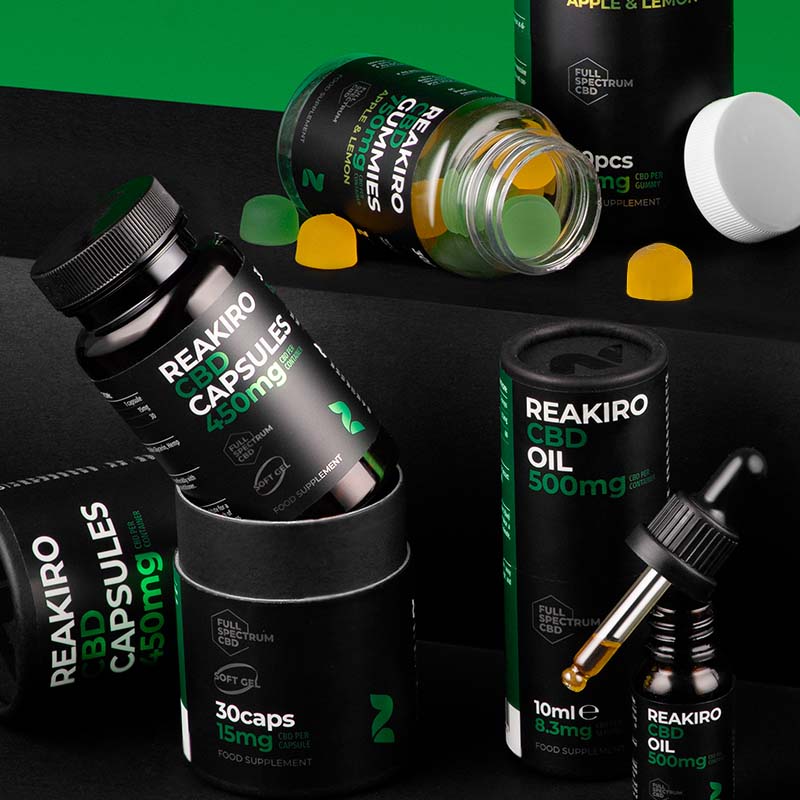Table of Contents
- CBD and CBG Explained
- An Overview of CBD
- Understanding CBG
- How CBD and CBG Differ
- Are There Positive Effects From Using CBD and CBG?
- Positive Effects Of Using CBD
- Positive Effects of Using CBG
- CBD vs CBG: Are There Any Side Effects You Should Be Worried About?
- CBD and CBG Dosage: What Will Work Best?
- Is It Legal to Buy CBD and CBG?
- Can CBD and CBG Be Combined?
- CBD vs Cbg: What Is the Better Option?
You're likely familiar with Cannabidiol (CBD), but there's another cannabinoid on the market that has sparked a lot of discussion: Cannabigerol (CBG). This chemical compound is prevalent in sativa plants, and it's becoming increasingly popular on the market, but is it all it's cracked up to be? Can it overtake CBD in the long run, or could the two even be used together? These are the questions on everyone's minds, which we'll help you answer.
Stay with us as we discuss the biggest cannabinoid debate at the moment, CBG vs CBD, and go through differences, effects and much more.
CBD and CBG Explained
Two of the main cannabinoids derived from the cannabis sativa plant are CBD and CBG, along with others like THC (tetrahydrocannabinol), CBN (cannabinol), and CBC (cannabichromene). Unlike the THC, when consumed, these cannabinoids don't cause any mind-altering effects. However, each has unique properties and potential benefits. Let’s take a closer look at both.
An Overview of CBD
CBD, officially known as Cannabidiol, is part of the group of 113 cannabinoids that are found in the cannabis sativa plant. It's not a psychoactive compound of the plant, so it doesn't affect your mental state.
When CBD is consumed, it interacts with the body’s endocannabinoid system indirectly, modulating CB2 receptors and increasing levels of natural endocannabinoids. The endocannabinoid system (ECS) plays a key role in managing essential bodily functions, including sleep, appetite, and immune responses. One of the great things about this is the person who consumes it doesn't get any of the reactions that come with smoking cannabis, but they receive the positive effects.
Understanding CBG
So, how about CBG? Scientifically recognised as Cannabigerol, CBG, just like CBD, is present in the cannabis sativa plant. The two actually connect to matching receptors, but it's not as widely used as CBD because it hasn't been studied as much.
On top of that, there's far less CBG in one cannabis plant than there is CBD, meaning higher levels of biomass are required to retrieve the same amount.
How CBD and CBG Differ
While CBD typically modulates cannabinoid receptors indirectly, CBG interacts more directly with both CB1 receptors, which are normally found in the brain and central nervous system, and CB2 receptors, predominantly located in the immune system and peripheral tissues.
So, what does this all mean? While they share some common ground, there are key differences between CBD and CBG that could make one more suitable for your needs. Let’s break down these differences for you.
- They Interact with the Same Receptors Differently
As we’ve touched on earlier, both CBD and CBG interact with the body’s cannabinoid receptors, but they don’t exactly go about it the same way. CBD doesn’t directly bind to CB2 receptors. Instead, it influences them indirectly by modulating the endocannabinoid system and boosting natural endocannabinoids like anandamide.
CBG, on the other hand, is much more direct. It binds to both CB1 and CB2 receptors, but the CB2 receptors are mainly found in the immune system and peripheral tissues, while CB1 receptors are more closely associated with the brain, central nervous system, and some cardiovascular functions.
- CBD Is a Major Cannabinoid, While CBG Is a Minor One
The concentration of CBD in a cannabis plant is typically much higher than that of CBG, making CBD easier and more cost-effective to extract. This is because CBG starts as CBGA, the precursor to cannabinoids like THC, CBD, and CBC.
As a result, CBG is usually found in lower concentrations in mature plants, as it’s converted into other cannabinoids during the plant’s growth. However, even though CBD tends to be easier to extract because of its abundance, it’s important to say that the chosen cultivation technique can have a massive impact on the actual concentration of CBG. For example, there are specific strains of cannabis that are bred to maximize CBG content, allowing for higher amounts of this unique cannabinoid.
Are There Positive Effects From Using CBD and CBG?
When you look at the research from afar, ther evidence supporting the positive effects of CBD compared to CBG is much more promising.
This is largely because CBD has been the subject of extensive studies over the years, building a solid foundation of knowledge. In contrast, CBG research is still in its early stages. There are a handful of reasons for this, including CBG’s lower concentration in mature cannabis plants and the higher cost of production.
That being said, early studies into CBG have shown some promising potential. For instance, CBG has demonstrated neuroprotective effects, which could be beneficial for conditions like neurodegenerative diseases, and there are some indications of antibacterial properties.
Positive Effects Of Using CBD
It Can Help With Inflammation Issues
An increasing number of studies support the claim that CBD has anti-inflammatory effects. One such study demonstrated that CBD could help regulate the immune response in dogs, reducing inflammation caused by LPS. While more research is needed, this is one of several hopeful reports suggesting that CBD may be beneficial for managing inflammation.
Aid in Managing Anxiety
Along with CBG, CBD also works for managing anxiety; it plays a key role in helping a person reduce their anxiety levels as it works with their endocannabinoid system; this is an integral part of the body that focuses on regulating someone's mood and stress levels.
We can point out a few studies to back up this claim, but the National Library of Medicine released a report that stuck with us, which tracked adults using CBD for two months. After the first month, 79.2% of patients reported reduced anxiety, and this progress remained high at 78.1% after the second month, demonstrating sustained benefits.
Assist in Overcoming Addiction
It has been suggested for a while now that CBD can assist people with overcoming addiction problems, whether it's smoking or alcohol. The reason for these claims is largely because of the anxiolytic properties in CBD, which are known to help with anxiety.
Researchers have looked into how CBD might help with addiction, specifically focusing on substances like opioids, psychostimulants, cannabis, tobacco, and cocaine. One study explored how CBD affects neurotransmission systems related to addiction and revealed optimistic results in both animal and human trials, though it's still early to draw definitive conclusions.
Enhances Sleep Quality
Many people use CBD (or CBG) for sleep improvements; they've been shown to be very effective in a study from the National Library of Medicine, which we mentioned earlier in relation to anxiety. It found that 66.7% of participants experienced better sleep after just a month of using CBD. What's even better is that 56.1% continued to see improvements in the second month. So, if you're after some quality Zzz's, this could be worth trying!
Positive Effects of Using CBG
While there’s still not as much research on CBG as there is on CBD, a few studies have shown promising results that have caught the attention of the cannabinoid industry. One analysis suggests that CBG, particularly in its acidic form, may offer benefits like reducing inflammation, acting as an antioxidant, easing anxiety, and stimulating appetite, but further trials are needed to confirm these effects.
CBD vs CBG: Are There Any Side Effects You Should Be Worried About?
While having any side effects from taking either CBD or CBG is rare, they can occasionally occur for some people. The most frequently reported effects include feeling a bit more tired than usual, dry mouth, changes in appetite, fatigue, and dry eyes.
It’s necessary to note that neither CBD nor CBG produces any psychoactive effects, so you won’t experience a "high" from using them. This is a common misunderstanding, as THC, the psychoactive compound in cannabis, is what causes that euphoric sensation.
Before purchasing any CBD or CBG products, take the time to research what you're buying. Make sure you choose high-quality, authentic products that will help you experience the full benefits. Unfortunately, there have been instances where companies have misrepresented the CBD/CBG content on their labels, selling products with lower amounts than advertised.
CBD and CBG Dosage: What Will Work Best?
When it comes to CBD and CBG, everyone’s needs are a little different, so finding the right dosage is key. Before you begin, you should first think about why you’re using either of these supplements. Depending on your goals, the recommended dosages can vary. Here's a quick breakdown to guide you:
- Concentration and energy: low dosage
- Stress and anxiety: medium dosage
- Inflammation: medium dosage
- Improved sleep: low dosage
Is It Legal to Buy CBD and CBG?
In the UK, it's entirely legal to buy both CBD and CBG, but there are a few major rules that these products must meet in order to be sold by the manufacturer. Before making a purchase, you must do your due diligence on the brand or manufacturer you're buying from. This ensures you're not unknowingly breaking any laws that could potentially cause issues down the line.
Can CBD and CBG Be Combined?
Combining CBD and CBG is generally safe and can even offer enhanced benefits for some people. Many products on the market combine these two cannabinoids, and the results so far suggest that this combination might work well for reducing anxiety and inflammation in certain cases. Additional research is still required to confirm these benefits fully, but the positive effects of both cannabinoids seem to outweigh any potential downsides.
CBD vs Cbg: What Is the Better Option?
That wraps up our comparison of CBD vs CBG, and you’re likely wondering which one is right for you. Both cannabinoids have their unique benefits, and choosing the right one depends on what you're hoping to achieve.
CBD has a well-established track record, and its benefits are backed by research, so you can feel confident knowing how it might help you. On the other hand, CBG is still in the early stages of research, so while the potential is there, we’re still waiting for more solid evidence to come through. For example, if you're dealing with a condition like irritable bowel disease, CBG might be the one to try, while CBD could be a better option for someone struggling with their sleep.
For those who are still unsure whether to go with CBD or CBG oils, consulting a doctor first and then experimenting with both might be a good approach. This will allow you to see how each one affects your body, and then you can choose which option contributes more to your wellness needs.



